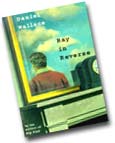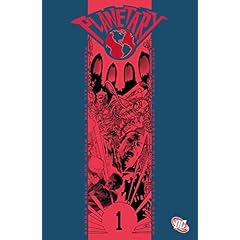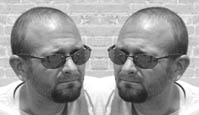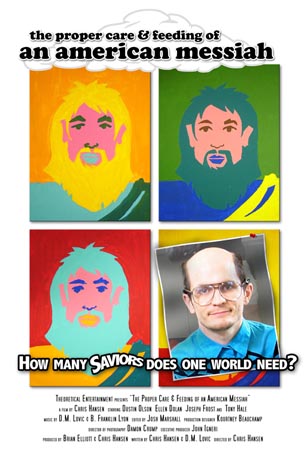Final Reading Reports from the Break
Well, the spring semester begins tomorrow, and I raced through a couple more things I wanted to read.
 Ray in Reverse, a novel by Daniel Wallace, author of Big Fish. We meet Ray in heaven, after he has died of cancer at a young age (around 50), and the novel tells his life story, or several key events in his life, in reverse, working its way back to about the age of 10. It's a touching story in some ways, a life story told in small occurrences, seemingly meaningless things that end up making up a man's whole life. In some ways, the "reverse" nature of the story seems like a gimmick. Though there are a few things that are revealed interestingly because the events are told in reverse order, on the whole I didn't feel like telling the story in this manner was really an integral part of the work as a whole.
Ray in Reverse, a novel by Daniel Wallace, author of Big Fish. We meet Ray in heaven, after he has died of cancer at a young age (around 50), and the novel tells his life story, or several key events in his life, in reverse, working its way back to about the age of 10. It's a touching story in some ways, a life story told in small occurrences, seemingly meaningless things that end up making up a man's whole life. In some ways, the "reverse" nature of the story seems like a gimmick. Though there are a few things that are revealed interestingly because the events are told in reverse order, on the whole I didn't feel like telling the story in this manner was really an integral part of the work as a whole.
But now, as I think about it, there are some interesting elements to having the story told in this manner. We learn that Ray has gotten back together with his wife before we ever knew she left him (or why). So while that removes the fear that Ray might not have ended up with the love of his life, it doesn't tell us why she left him in the first place. And it doesn't tell him, to tell the truth, whether or not she IS the love of his life. It's this kind of revelatory detail that shows us how life doesn't always end up the way we expect, and how what we appear to be at the end or our lives might not tell the whole story.
I'll have to think on it some more. Check out Wallace's site, where he blogs a bit and draws a bit and other stuff.
 Planetary, a graphic novel by Warren Ellis, et al. (Actually, I read it in graphic novel form, but it's a compilation of single editions of the original comic). I used to be a comic book geek as a kid, and though I kicked that habit a long time ago, I remain interested in them. ("Kicked the habit" sounds unnecessarly pejorative; I'm not maligning comics but rather my own childhood obsession with them). Planetary is the kind of comic that keeps bringing me back to the form. It's about a secret group of super-powered "achaeologists" who are trying to "write the secret history of the 20th century" by observing and uncovering all of the secret events of the past 100 years. There's some big mystery to which it's building, and this has something to do with the fact that several of the mysterious characters have the same birthdate -- January 1, 1900. And of course, none of these people appear to be a day over 50.
Planetary, a graphic novel by Warren Ellis, et al. (Actually, I read it in graphic novel form, but it's a compilation of single editions of the original comic). I used to be a comic book geek as a kid, and though I kicked that habit a long time ago, I remain interested in them. ("Kicked the habit" sounds unnecessarly pejorative; I'm not maligning comics but rather my own childhood obsession with them). Planetary is the kind of comic that keeps bringing me back to the form. It's about a secret group of super-powered "achaeologists" who are trying to "write the secret history of the 20th century" by observing and uncovering all of the secret events of the past 100 years. There's some big mystery to which it's building, and this has something to do with the fact that several of the mysterious characters have the same birthdate -- January 1, 1900. And of course, none of these people appear to be a day over 50.
I like works like this because I like the idea of exploring things that occur below the surface. The structure of Planetary, as a series, is to explore sometimes smaller mysteries (like a murdered ghost-cop haunting a specific street corner in Hong Kong) in order to bring together the details to understand a larger picture. The story has definitely hooked me in. I confess, I have no idea what it's building to, but I'm intrigued and will be buying the next two volumes as soon as I can afford to.
And those are the last two pleasure reads I'll be able to report on. I am sure I'll find some time this spring semester to do a little bit of pleasure reading, but not much. Since my course on Mavericks of the 70s American Cinema is a new one, I'll be putting a lot of time into prepping that. First weekly screening for the course is The Godfather, the film that created Francis Ford Coppola's persona as the reigning 70s auteur and godfather to a new generation of filmmakers.
I almost forgot: I also read Changing Places by David Lodge. It's his 1975 novel about academics switching institutions for a semester. To be honest, I picked out this book because I'd heard Lodge's novels about academics were great satirical looks at academia. And I suppose that was true back in '75 when it was published. It's set in 1969 and deals withthe sexual revolution as well as the changing political climate in the United States, especially on college campuses, at the time. But it just didn't seem to be that relevant to today's academia, and frankly the sexual politics were so dated as to seem positively naive. This is my second Lodge novel, and the first (Therapy) is one of the rare novels that I didn't even finish. It wasn't terrible or anything, but it left me dry, and it just wasn't compelling enough to finish. So when another novel came in that I had been looking forward to, I just stopped. So, I guess what I'm saying is that I'm done with Lodge for now. No offense, of course (to David Lodge, should he perhaps be reading this blog, which I realize is highly unlikely).
 Ray in Reverse, a novel by Daniel Wallace, author of Big Fish. We meet Ray in heaven, after he has died of cancer at a young age (around 50), and the novel tells his life story, or several key events in his life, in reverse, working its way back to about the age of 10. It's a touching story in some ways, a life story told in small occurrences, seemingly meaningless things that end up making up a man's whole life. In some ways, the "reverse" nature of the story seems like a gimmick. Though there are a few things that are revealed interestingly because the events are told in reverse order, on the whole I didn't feel like telling the story in this manner was really an integral part of the work as a whole.
Ray in Reverse, a novel by Daniel Wallace, author of Big Fish. We meet Ray in heaven, after he has died of cancer at a young age (around 50), and the novel tells his life story, or several key events in his life, in reverse, working its way back to about the age of 10. It's a touching story in some ways, a life story told in small occurrences, seemingly meaningless things that end up making up a man's whole life. In some ways, the "reverse" nature of the story seems like a gimmick. Though there are a few things that are revealed interestingly because the events are told in reverse order, on the whole I didn't feel like telling the story in this manner was really an integral part of the work as a whole.But now, as I think about it, there are some interesting elements to having the story told in this manner. We learn that Ray has gotten back together with his wife before we ever knew she left him (or why). So while that removes the fear that Ray might not have ended up with the love of his life, it doesn't tell us why she left him in the first place. And it doesn't tell him, to tell the truth, whether or not she IS the love of his life. It's this kind of revelatory detail that shows us how life doesn't always end up the way we expect, and how what we appear to be at the end or our lives might not tell the whole story.
I'll have to think on it some more. Check out Wallace's site, where he blogs a bit and draws a bit and other stuff.
 Planetary, a graphic novel by Warren Ellis, et al. (Actually, I read it in graphic novel form, but it's a compilation of single editions of the original comic). I used to be a comic book geek as a kid, and though I kicked that habit a long time ago, I remain interested in them. ("Kicked the habit" sounds unnecessarly pejorative; I'm not maligning comics but rather my own childhood obsession with them). Planetary is the kind of comic that keeps bringing me back to the form. It's about a secret group of super-powered "achaeologists" who are trying to "write the secret history of the 20th century" by observing and uncovering all of the secret events of the past 100 years. There's some big mystery to which it's building, and this has something to do with the fact that several of the mysterious characters have the same birthdate -- January 1, 1900. And of course, none of these people appear to be a day over 50.
Planetary, a graphic novel by Warren Ellis, et al. (Actually, I read it in graphic novel form, but it's a compilation of single editions of the original comic). I used to be a comic book geek as a kid, and though I kicked that habit a long time ago, I remain interested in them. ("Kicked the habit" sounds unnecessarly pejorative; I'm not maligning comics but rather my own childhood obsession with them). Planetary is the kind of comic that keeps bringing me back to the form. It's about a secret group of super-powered "achaeologists" who are trying to "write the secret history of the 20th century" by observing and uncovering all of the secret events of the past 100 years. There's some big mystery to which it's building, and this has something to do with the fact that several of the mysterious characters have the same birthdate -- January 1, 1900. And of course, none of these people appear to be a day over 50.I like works like this because I like the idea of exploring things that occur below the surface. The structure of Planetary, as a series, is to explore sometimes smaller mysteries (like a murdered ghost-cop haunting a specific street corner in Hong Kong) in order to bring together the details to understand a larger picture. The story has definitely hooked me in. I confess, I have no idea what it's building to, but I'm intrigued and will be buying the next two volumes as soon as I can afford to.
And those are the last two pleasure reads I'll be able to report on. I am sure I'll find some time this spring semester to do a little bit of pleasure reading, but not much. Since my course on Mavericks of the 70s American Cinema is a new one, I'll be putting a lot of time into prepping that. First weekly screening for the course is The Godfather, the film that created Francis Ford Coppola's persona as the reigning 70s auteur and godfather to a new generation of filmmakers.
I almost forgot: I also read Changing Places by David Lodge. It's his 1975 novel about academics switching institutions for a semester. To be honest, I picked out this book because I'd heard Lodge's novels about academics were great satirical looks at academia. And I suppose that was true back in '75 when it was published. It's set in 1969 and deals withthe sexual revolution as well as the changing political climate in the United States, especially on college campuses, at the time. But it just didn't seem to be that relevant to today's academia, and frankly the sexual politics were so dated as to seem positively naive. This is my second Lodge novel, and the first (Therapy) is one of the rare novels that I didn't even finish. It wasn't terrible or anything, but it left me dry, and it just wasn't compelling enough to finish. So when another novel came in that I had been looking forward to, I just stopped. So, I guess what I'm saying is that I'm done with Lodge for now. No offense, of course (to David Lodge, should he perhaps be reading this blog, which I realize is highly unlikely).



0 Comments:
Post a Comment
<< Home